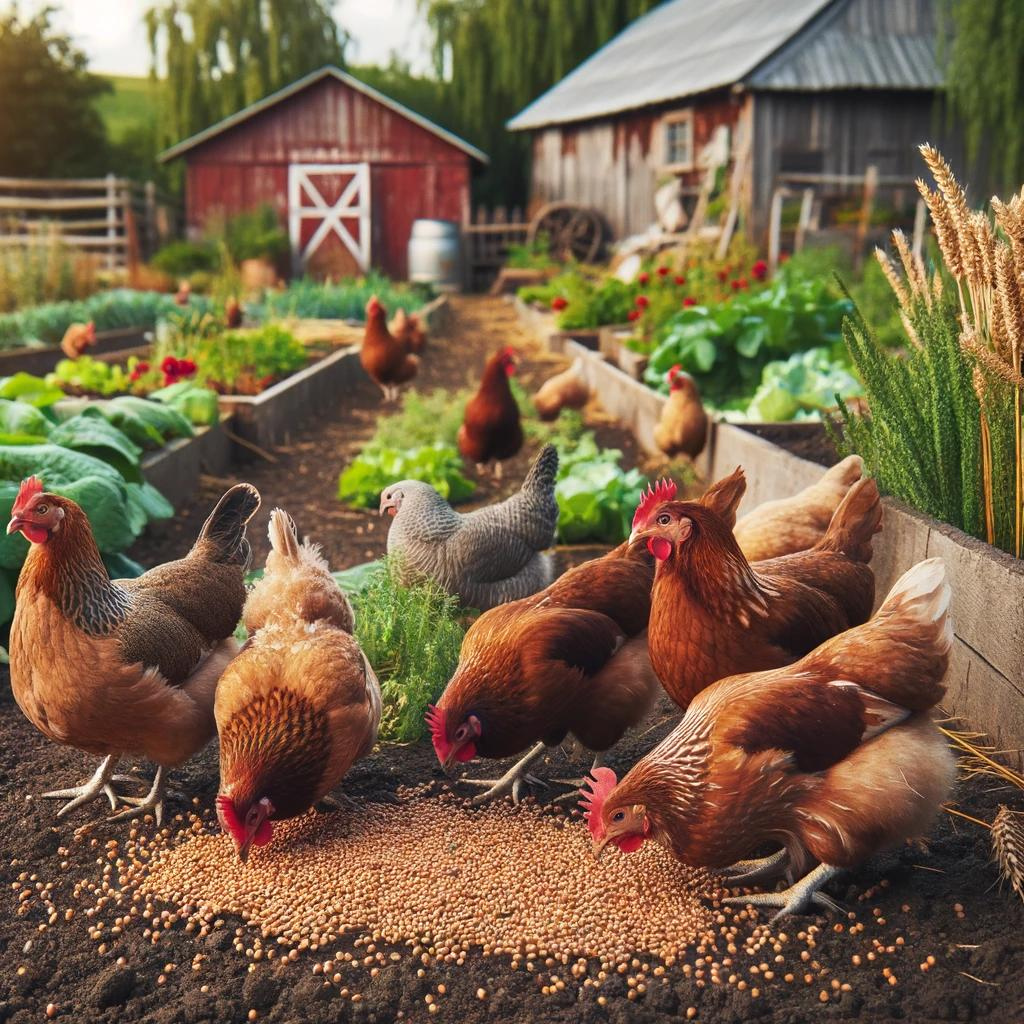
Yes, chickens can eat wheat berries. Wheat berries are the whole, unprocessed kernels of wheat, and they can be fed to chickens as part of their diet. However, to aid in digestion, it’s recommended to crack or grind the wheat berries before feeding them to chickens, especially for young birds or those with difficulty processing whole grains.
What Are Wheat Berries, and Are They Safe for Chickens?
Wheat berries are the whole, unprocessed kernels of wheat. They are safe for chickens to eat and can provide them with essential nutrients. However, since wheat berries are whole grains, they may be difficult for some chickens to digest. Grinding or cracking the wheat berries can aid in digestion, especially for young birds or those with difficulty processing whole grains. Offering a variety of textures in their diet can enrich their feeding experience.
Are Wheat Berries Nutritious for Chickens?
Yes, wheat berries are nutritious for chickens, providing essential nutrients like carbohydrates, protein, fiber, vitamins, and minerals. They support chickens’ overall health and growth. Offer them in moderation as part of a balanced diet.
Should Wheat Berries Be Cooked Before Feeding Them to Chickens?
No, wheat berries do not need to be cooked before feeding them to chickens. Chickens can consume wheat berries raw or slightly cracked. However, grinding or cracking the wheat berries can aid in digestion, especially for young birds or those with difficulty processing whole grains.
How Should Wheat Berries Be Prepared for Chickens?
Wheat berries can be prepared for chickens by grinding or cracking them before feeding. This aids in digestion, especially for young birds or those with difficulty processing whole grains. Alternatively, you can offer wheat berries whole, but monitor chickens for any digestive issues. Ensure they have access to fresh water while consuming wheat berries.
Can Wheat Berries Be Given Whole to Chickens, or Should They Be Ground?
While wheat berries can be given whole to chickens, grinding or cracking them before feeding is generally recommended. This helps chickens digest the grains more easily, especially for young birds or those with difficulty processing whole grains. Grinding or cracking wheat berries can enhance their nutritional absorption and reduce the risk of digestive issues.
Are There Any Benefits to Including Wheat Berries in Chickens’ Diet?
Yes, including wheat berries in chickens’ diet offers several benefits. Wheat berries are a nutritious source of carbohydrates, protein, fiber, vitamins, and minerals, supporting chickens’ overall health and growth. They provide energy for chickens’ daily activities and help maintain their digestive health. Additionally, offering a variety of feed textures can enrich chickens’ feeding experience and encourage natural foraging behaviors.
Can Wheat Berries Help with Chickens’ Digestive Health?
Yes, wheat berries can contribute to chickens’ digestive health. They contain fiber, which supports proper digestion and helps prevent digestive issues such as impacted crop or sour crop. Additionally, grinding or cracking wheat berries before feeding them to chickens can aid in digestion, ensuring optimal nutrient absorption and reducing the risk of digestive upset. Overall, including wheat berries as part of a balanced diet can promote chickens’ digestive well-being.
Can Wheat Berries Help Chickens Lay Better Eggs?
Wheat berries can indirectly support chickens’ egg-laying by providing them with essential nutrients necessary for overall health and well-being. While wheat berries themselves may not directly stimulate egg production, incorporating them into a balanced diet alongside other high-quality feed ingredients can contribute to optimal egg-laying performance. Ensuring chickens receive adequate nutrition, including protein, vitamins, and minerals, is crucial for maximizing egg production.
Can Baby Chicks Eat Wheat Berries Safely?
Yes, baby chicks can safely eat wheat berries. However, it’s essential to ensure that the wheat berries are finely ground or cracked to facilitate their digestion, as young chicks may have difficulty processing whole grains. Additionally, offering wheat berries alongside a complete chick starter feed is recommended to provide them with all the necessary nutrients for healthy growth and development.
How Much Wheat Berries Should Be Given to Chickens?
Offer wheat berries as part of a balanced diet, comprising up to 10-20% of total daily feed intake. Adjust quantity based on chickens’ needs.
Can Wheat Berries Cause Any Harm or Digestive Issues in Chickens?
While wheat berries are generally safe for chickens, feeding them in excessive amounts or without proper preparation can potentially lead to digestive issues. Whole wheat berries may be difficult for some chickens to digest, especially young birds or those with sensitive digestive systems. Grinding or cracking wheat berries before feeding them to chickens can help mitigate digestive issues and improve nutrient absorption.
Can Wheat Berries Serve as a Replacement for Other Types of Chicken Feed?
Wheat berries should not serve as a sole replacement for other types of chicken feed. While they are nutritious, they lack certain essential nutrients found in complete chicken feeds, such as vitamins, minerals, and balanced protein sources. Wheat berries can complement a balanced diet for chickens but should be used alongside other feed sources to ensure chickens receive all necessary nutrients for optimal health and egg production.
Are There Different Varieties of Wheat Berries Suitable for Chickens?
Yes, there are different varieties of wheat berries suitable for chickens. Common varieties include hard red wheat, soft white wheat, and durum wheat. All these varieties can provide essential nutrients to chickens and are suitable for inclusion in their diet. Offering a variety of wheat berry types can enrich their feeding experience and provide different nutritional benefits.
How Should Wheat Berries Be Stored to Maintain Freshness for Chickens?
To maintain freshness, store wheat berries in a cool, dry place in a sealed container to prevent moisture and pests from affecting them. Ideally, store them in airtight containers or bins to protect them from humidity and pests. Rotate your wheat berry supply regularly to ensure you’re using the oldest stock first.
*Always speak with your veterinarian before adding a new food to your chicken’s diet.